Academics
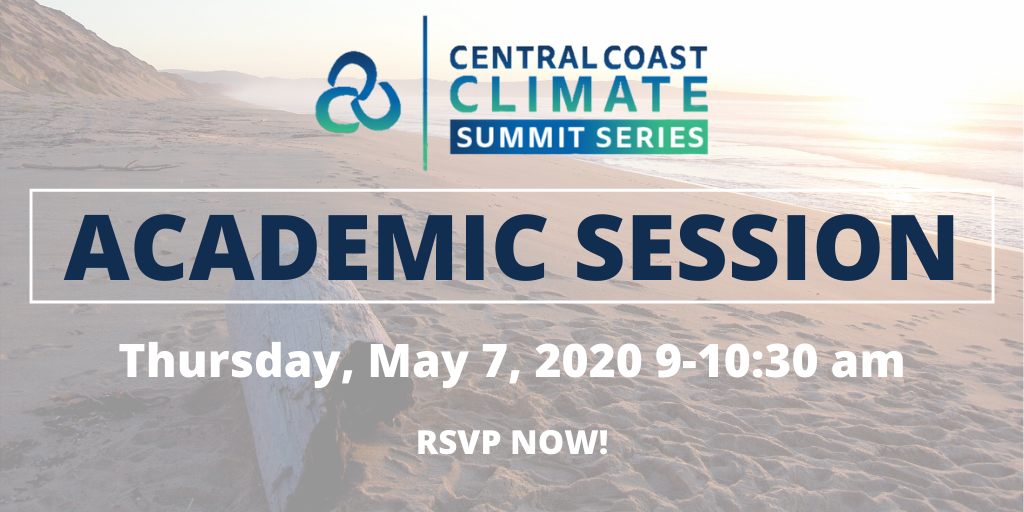
We invite you to attend the Central Coast Climate Summit Series. The Academic Session will be on May 7th, 2020 from 9-10:30am. Policy and business will be the focus of future events.
This session will include keynote comments by Mr. Tim Carter, President of Second Nature followed by breakout sessions for various academic fields of study as well as K-12 and community education. The RSVP button is below.
In this event will provide the opportunity to:
-Connect with others in the K-12, Higher Education, and Community Education fields around the topic of climate change
-Explore how a variety of disciplines and field of study intersect with issues of climate change
-Identify avenues to further integrate climate change into learning experiences in the interest of developing and shaping policy to alter the trajectory of climate change
Sustainable City Year Program
The Sustainable City Year Program (SCYP) is a university-community connection where cities work with universities to “matchmake” community needs as determined by someone in city management to university expertise. One of the unique features of this model is the interdisciplinary that it engenders. In other words, partnerships are created across many disciplines on campus. So far that has included Environmental Studies, Social and Behavioral Science, Statistics and Psychology.
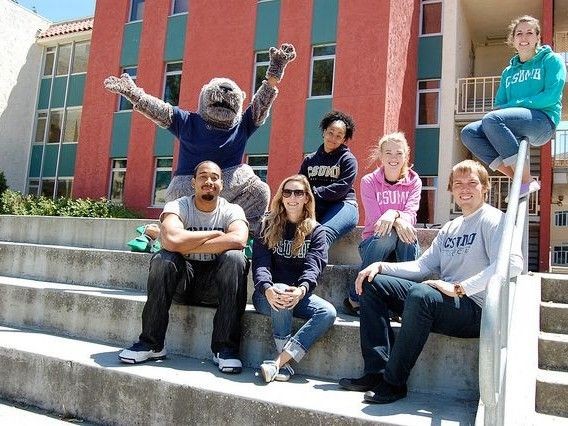
The Sustainable Hospitality Management Program
Students gain hands-on knowledge and skills needed to pursue careers in hospitality management, with a focus on sustainability. Gain valuable, hands-on experience through volunteering, internships, and work-study programs at world-class hotels, restaurants, resorts.
Sustainability Capstone Projects
The Sustainability Capstone Projects demonstrate students' understanding of the field, as well as their ability to critically evaluate and synthesize materials across sustainability and related disciplines.
Coastal and Marine Ecosystems Program (CMEP)
The Coastal and Marine Ecosystems Program (CMEP) is a research and education program within the School of Natural Sciences at California State University, Monterey Bay. Through funding provided by the National Science Foundation and the National Oceanic and Atmospheric Administration, CMEP supports basic research to increase our understanding of coastal and marine ecosystems from coastal wetlands to the open ocean and deep sea.
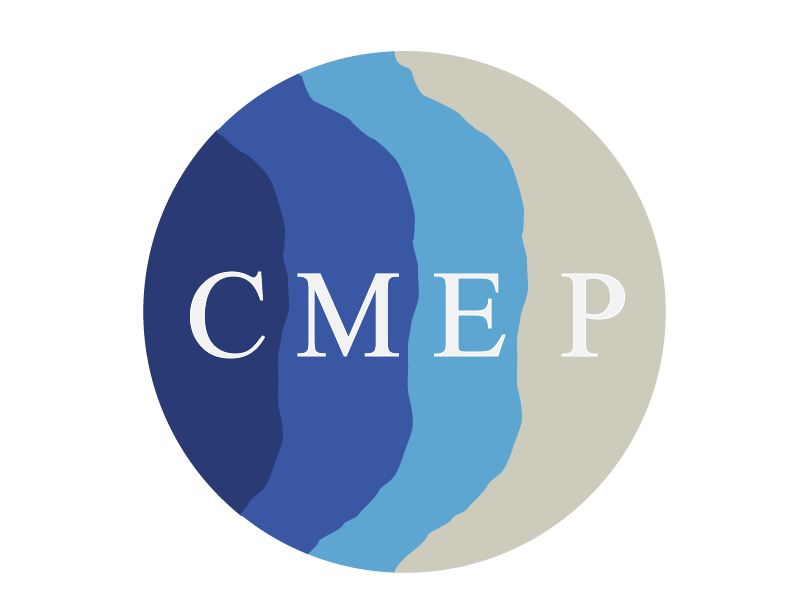
Artist-in-Residence Program
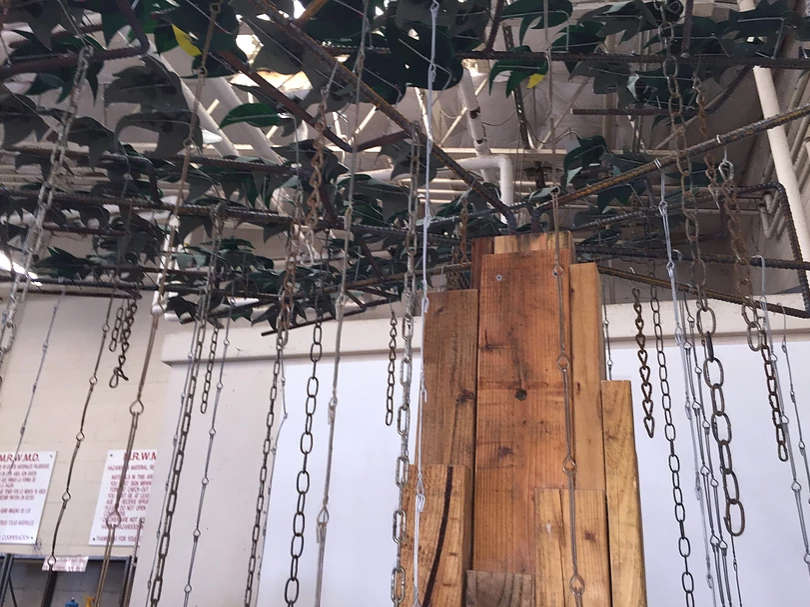
This Artist-in-Residency Program (AIR) was implemented as a collaborative partnership between the Visual and Public Art department and the Monterey Regional Waste Management District.
Last Chance Mercantile
Using a minimal approach, Ben Ward created a 10x7' stylized representation of a tree. The raw material, such as lumber, is re-assembled to create a man-made tree using material that were once living tissue (inner bark), and are now outer tissue (dry dead bark) to reference the interference that humans have had on our natural environment.
Terrestrial Wildlife Ecology Lab
In the Terrestrial Wildlife Ecology Lab, students study responses of wildlife to changes in land use and cover. Students test ecological theory while providing wildlife managers with the information, methods, and tools needed to make science-based management decisions.
Want to get involved? Contact: jduggan@csumb.edu or head to https://csumb.edu/twe!
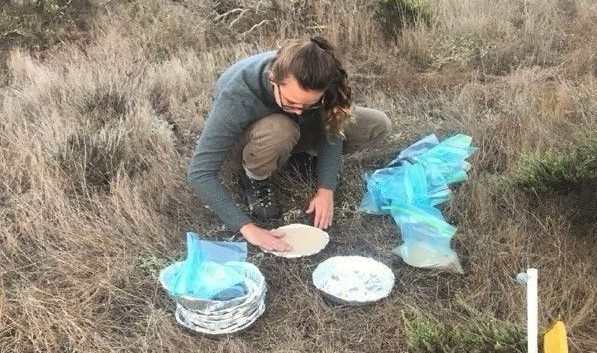
Watershed Institute
The Watershed Institute on our campus connects the natural environment and our education together. Students taking a number of courses focused on: Environmental Studies, Environmental Science, Geology, and Physical Science have the opportunity to work on community-based restoration steps away from their classroom. Through maintaining the watershed, students are able to restore the natural habitat, prevent topsoil loss, and provide habitats for wildlife and natural communities.
Check out the Watershed Institute for more information about Watershed programs and courses.
Campus as a Living Lab Program
CSUMB faculty and staff have developed the “Campus as a Living Lab” (CALL) grant program, an outcome of funding from the National Science Foundation. These projects are designed for students to confront real-world sustainability problems and address the planet’s environmental challenges. The CSUMB "Campus as a Living Lab" projects include:
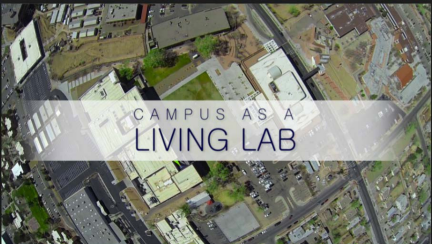
Check out CSU Campus as a Living Lab for more information about projects and involvement.
The following majors and minors are intended to gear students towards a sustainable career:
- Environmental Science, Technology & Policy B.S: The Environmental Science, Technology & Policy major blends biology, chemistry, physics and the earth sciences to prepare students for jobs in environmental science, resource management, habitat restoration, applied ecology, natural resources, and more. Students choose one of three concentrations in applied ecology, watershed systems or natural resources.
- Environmental Studies B.A: The Environmental Studies major is less science intensive than the Environmental Science, Technology & Policy major. After establishing a basis of environmental science knowledge, students take career-specific courses their chosen concentration - either Environmental Education or Science for Sustainable Communities.
- Marine Science B.S: Students in the Marine Science major study marine ecosystems and marine resource management. They can choose courses in marine biology in addition to courses such as seafloor mapping, scientific diving, and ocean instrumentation, and more.
- Global Studies B.A: In the Global Studies major, students develop knowledge of U.S. foreign policy and world history. They encounter diverse world-views and ideologies and analyze global social, economic and political problems. Students are challenged to consider new options for complex global problems, and prepared for careers in the foreign service, international NGOs, political campaigns, and more.
- Collaborative Health and Human Services B.A: The Collaborative Health and Human Services major prepares students to be counselors, social workers, public health workers and nonprofit administrators. Students complete classes and fieldwork, and can choose a concentration in social work, community health, or public administration.
- Environmental Health Policy Minor: The Environmental Health Policy minor allows you to develop the knowledge and professional skills necessary to pursue a successful career or graduate degree program in health-related or environmental fields. A collaborative effort, EHP facilitates interdisciplinary studies, drawing from the Environmental Science, Technology & Policy (ESTP) and Collaborative Health and Human Services (CHHS) programs.
- Sustainable Hospitality Management B.S: The Sustainable Hospitality Management major provides students with a broad foundation in hospitality, sustainability, leadership and management, and it provides students with local, regional, and global perspectives on sustainability issues within the hospitality industry.
- Kinesiology B.S: The Kinesiology major takes a scientific approach to understanding the human body, exercise, health and wellness. Students can choose a concentration in either exercise science or wellness. Classes include hands-on labs, and cover the basics of anatomy and physiology all the way up to health policy and outreach techniques.
- Humanities & Communication B.A: The Human Communication major is a blend of literature, history, philosophy, communication, journalism, and creative writing, as well as ethnic studies, American studies, women’s studies, and cultural studies. Students develop a broad basis in the humanities, and can choose to focus in one of 13 concentrations.
For more information about Majors & Minors, check out CSUMB's Majors and Programs page.
Institutional Learning Outcomes (ILO) are applied to all undergraduate degree programs. They assure the measurement of student learning in a systematic way consistent with the CSUMB commitment to outcomes based education. Currently, there is only one ILO that mentions sustainability.
Institutional Learning Outcome 2: Personal, professional, and social responsibility
CSUMB graduates demonstrate ethical reasoning, global awareness, and civic and intercultural engagement in ways that promote sustainability, and social justice and equity across diverse communities.
Advancing the Vision - Academic Plan 2015-2020
As a division committed to Regional Stewardship and Global Engagement, we will
- Strengthen educational partnerships across the region and the world to increase educational attainment
- Provide contemporary and innovative online and community-located educational opportunities
- Provide students with experiences and skills to make them at home in the world
- Contribute to increased sustainable economic development in the region
- Create increased opportunities for student learning and practice of environmental sustainability
As a division committed to Diversity, we will
- Attract, support, and recognize a diverse and high achieving community of students, faculty, and staff
- Strengthen our commitment to multilingual, multicultural, and gender-equitable learning
- Reflect an ethos of inclusive excellence in all academic practices and programs and recognize the unique assets of our diversity
- Develop a global engagement strategy
As a division committed to Ethical and Sustainable Practice, we will
- Increase efficiency, effectiveness, ethical practice, and transparency in our operations
- Foster a culture of and process for continuous assessment and improvement of academic programs
- Provide leadership in the region for environmental sustainability
- Continue to develop needed coherent and consistent academic policies and processes
Measuring Progress
A course may be a sustainability course or it may include sustainability; no course should be identified as both.
Sustainability course: a course that demonstrates all three pillars of sustainability: environmental protection, social responsibility, and economic practice
Course that includes sustainability: a course that demonstrates only one or two of the three pillars of sustainability: environmental protection, social responsibility, and economic practice
The following information calculates the amount of courses offered by the institution that are sustainability course offerings:
Undergraduate Graduate Total number of courses offered by the institution 1,619 451 Number of sustainability courses offered 18 45 Number of courses offered that include sustainability 64 17 Percentage of courses that are sustainability course offerings:
Percentage of departments with sustainability course offerings:
Number of departments (or the equivalent) that offer at least one sustainability course and/or course that includes sustainability (at any level):
7%
46%
11
* Percentages were rounded up if the percentage digits end with a 5 or greater.
The STARS Report
The Sustainability Tracking, Assessment & Rating System™ (STARS) is a transparent, self-reporting framework for colleges and universities to measure their sustainability performance. As of 2018, CSUMB rates Silver in STARS ranking and has a score of 54.75. For a detailed understanding of how CSUMB ranks, check out our complete STARS Report 2018.